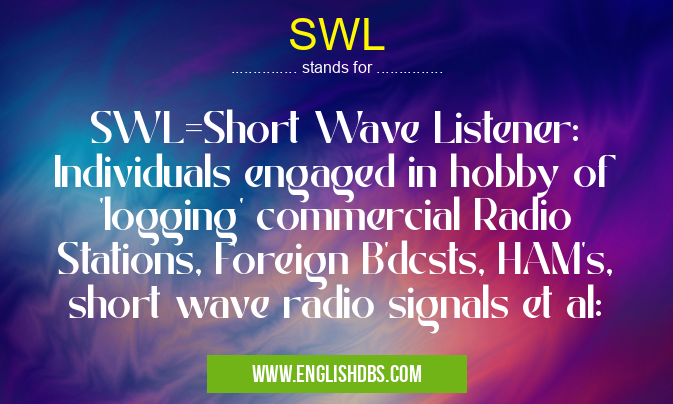What does SWL mean in INTERNATIONAL
Short Wave Listener (SWL) is a term used to refer to individuals who are engaged in the hobby of logging radio stations, foreign broadcasts, HAMs (amateur radio operators) and short wave radio signals worldwide. This activity is referred to as 'logging', and it involves recording the date, frequency of transmission, station name and other relevant information about the broadcast heard. SWLing can be both an educational and recreational activity, allowing listeners to explore new places around the world from their own home or while travelling.

SWL meaning in International in International
SWL mostly used in an acronym International in Category International that means SWL=Short Wave Listener: Individuals engaged in hobby of 'logging' commercial Radio Stations, Foreign B'dcsts, HAM's, short wave radio signals et al:
Shorthand: SWL,
Full Form: SWL=Short Wave Listener: Individuals engaged in hobby of 'logging' commercial Radio Stations, Foreign B'dcsts, HAM's, short wave radio signals et al:
For more information of "SWL=Short Wave Listener: Individuals engaged in hobby of 'logging' commercial Radio Stations, Foreign B'dcsts, HAM's, short wave radio signals et al:", see the section below.
Benefits
The main benefit of being an SWL is that you can learn a great deal about different cultures, languages and music styles from around the world without ever leaving your own living room. Also, if you’re looking for an interesting side-hobby or want something unique to do while travelling overseas, then SWling can provide a great sense of satisfaction by allowing you to listen in on distant conversations or gain insight into unfamiliar topics that may not even be available through television or newspapers. All these benefits make being an SWL quite exciting!
Essential Questions and Answers on SWL=Short Wave Listener: Individuals engaged in hobby of 'logging' commercial Radio Stations, Foreign B'dcsts, HAM's, short wave radio signals et al: in "INTERNATIONAL»INTERNATIONAL"
What kind of devices do SWL use to listen to radio signals?
SWLs typically use receivers, often amateur radios, to tune in and listen to available channels. These may be tuned manually or using a computer program. Some radios even feature pre-set frequencies which can be easily selected for different services such as digital broadcasts, amateur radio operations, etc.
How can I tell the difference between commercial radio stations and shortwave broadcasts?
The most obvious difference is the frequency on which they are transmitted. Commercial broadcasts typically use AM (amplitude modulation) and FM (frequency modulation) between 87.5 MHz and 108 MHz, while shortwave radio broadcasts fall in the bands between 3 MHz to 30 MHz.
What is Amateur Radio Operator (HAM)?
Amateur Radio Operators (HAMs) are licensed personnel who are allowed by their country's regulatory authority to transmit signals across certain frequencies for the purposes of experimentation or communication with fellow HAM operators around the world. A HAM operator must obtain a license and abide by regulations regarding frequency usage in order to operate legally.
What is logging of a signal?
Logging is the process of recording data about radio transmissions for further analysis or reference. This includes information such as frequency, power output, date & time received/transmitted, station ID/name and more. A logbook of all transmissions can be used as evidence that a particular channel was operating at a given time period or that contact was made with another HAM operator across large distances, etc.
Is it possible to listen to two-way conversations?
Yes it is possible for an experienced listener to pick up two-way conversations by carefully tuning into signals from both the transmitting and receiving stations simultaneously on same frequency or separate frequencies within close proximity of one another depending on propagation conditions. It takes some practice but can provide interesting listening experiences for those willing to put in some effort!
What type of equipment should I invest in for Short Wave Listening?
An ideal set up would include a good quality receiver along with an antenna specifically designed for shortwave listening. For those just starting out with this hobby it's best not too go overboard with purchasing equipment initially rather aim for something that allows you explore the hobby without breaking the bank!
Are there any special precautions required when using shortwave listening equipment?
Yes there are certain safety measures recommended when using any kind of electrical equipment including SWL gear such as unplugging from mains supply when not in use, avoiding water ingress around connectors etc...It's also important not to overload your device by pushing too much power through at once; check your user manual before doing so!
What techniques should I employ when trying to identify unknown signals?
When trying to identify unknown signals there are several steps one can take such as plotting them on spectrum analysers/maps if available and double checking any assumptions made against known databases or call signs recorded previously via logging activities for accuracy and reliability during identification process.
Final Words:
In conclusion, Short Wave Listener (SWL) activities offers one fascinating way of learning more about the different parts of our global community without ever needing to leave your living room — all while enjoying some interesting audio entertainment along the way! Whether you’re just looking for something fun to do on long international flights or want an intriguing side-hobby that someone else might not quite appreciate as much as you do — becoming an SWLer could be just what you need!
